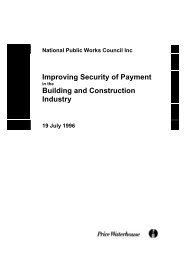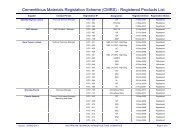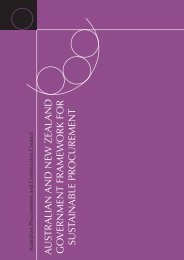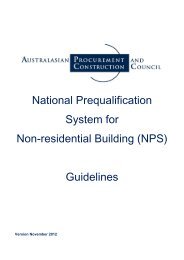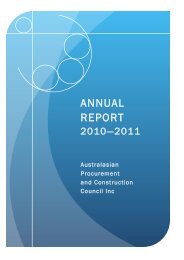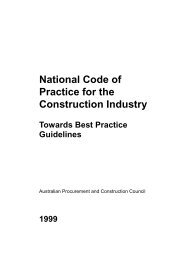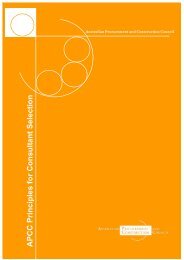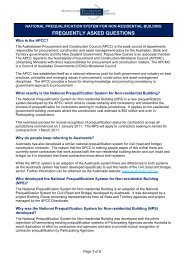NPS Registration for Mutual Recognition Form - Australian ...
NPS Registration for Mutual Recognition Form - Australian ...
NPS Registration for Mutual Recognition Form - Australian ...
Create successful ePaper yourself
Turn your PDF publications into a flip-book with our unique Google optimized e-Paper software.
National Prequalification<br />
System <strong>for</strong><br />
Non-residential Building<br />
(<strong>NPS</strong>)<br />
<strong>Registration</strong> <strong>for</strong><br />
<strong>Mutual</strong> <strong>Recognition</strong> <strong>Form</strong>
The National Prequalification System <strong>for</strong> Non-residential Building (<strong>NPS</strong>) aims to<br />
create certainty and consistency, and streamline the process of prequalification <strong>for</strong><br />
contractors working in multiple jurisdictions. It applies to non-residential government<br />
building contracts where the construction cost estimate is $50 million and above in<br />
Participating Jurisdictions. This seamless process <strong>for</strong> mutual recognition of<br />
prequalification status <strong>for</strong> contractors across all jurisdictions commenced on 1<br />
January 2011.<br />
Participating Jurisdictions and Participating Agencies<br />
New South Wales<br />
Western Australia<br />
South Australia<br />
Victoria<br />
NSW Procurement, Department of Finance and Services<br />
Building Management and Works, Department of Finance<br />
Building Management, Department <strong>for</strong> Transport, Energy and<br />
Infrastructure<br />
Construction Supplier Register, Department of Transport<br />
Queensland<br />
Tasmania<br />
Northern Territory<br />
<strong>Australian</strong> Capital<br />
Territory<br />
Commonwealth<br />
Works Division, Department of Public Works<br />
Procurement and Property Branch, Department of Treasury and<br />
Finance<br />
Procurement Policy, Department of Business and Employment<br />
ACT Procurement Solutions, Department of Treasury<br />
Various agencies that may undertake non-residential building<br />
construction<br />
NOTE: Commonwealth agencies are unlikely to process prequalification applications. Where<br />
a Commonwealth agency decides to seek tenders from prequalified contractors, it will<br />
recognise relevant prequalification status awarded by States and Territories under the APCC<br />
National Prequalification System.<br />
<strong>NPS</strong> Documents<br />
Applicants should access the full set of <strong>NPS</strong> documents be<strong>for</strong>e undertaking their applications.<br />
1. <strong>NPS</strong> Guidelines (explaining the <strong>NPS</strong> system)<br />
2. <strong>NPS</strong> Application <strong>Form</strong> and Referee Report (application <strong>for</strong> prequalification)<br />
3. <strong>NPS</strong> <strong>Registration</strong> <strong>for</strong> <strong>Mutual</strong> <strong>Recognition</strong> <strong>Form</strong> (this document)<br />
4. <strong>NPS</strong> Contractor Per<strong>for</strong>mance Report (review of per<strong>for</strong>mance and compliance)<br />
All documents can be downloaded from www.apcc.gov.au<br />
<strong>NPS</strong> <strong>Mutual</strong> <strong>Recognition</strong> <strong>Registration</strong> <strong>Form</strong> Apri1 2011
ENQUIRIES - ASSESSING AGENCY CONTACT DETAILS<br />
<strong>Registration</strong> <strong>for</strong> <strong>Mutual</strong> <strong>Recognition</strong> <strong>Form</strong> Lodgement<br />
1) Email Address: (this is the preferred mode of communication)<br />
2) Postal Address: (alternative mode of communication)<br />
General <strong>NPS</strong> enquiries are to be directed through the email address above.<br />
3) Urgent enquiries may be made to the following Contact Officers:<br />
[Insert names and contact details of Contact Officers]<br />
<strong>NPS</strong> <strong>Mutual</strong> <strong>Recognition</strong> <strong>Registration</strong> Fo rm April 2011
INSTRUCTIONS TO APPLICANTS:<br />
1. The <strong>Registration</strong> <strong>for</strong> <strong>Mutual</strong> <strong>Recognition</strong> <strong>Form</strong> is to be completed by the Applicant and<br />
lodged preferably electronically with the Assessing Agency where prequalification (under the<br />
<strong>NPS</strong>) has been awarded.<br />
2. A lodged <strong>Registration</strong> <strong>for</strong> <strong>Mutual</strong> <strong>Recognition</strong> <strong>Form</strong> will be submitted by the Assessing<br />
Agency to the Participating Agency/ies <strong>for</strong> processing where mutual recognition of the <strong>NPS</strong><br />
is being sought.<br />
3. Subject to jurisdictional due diligence assessment, notification of <strong>NPS</strong> mutual recognition<br />
will be provided by the Assessing Agency.<br />
SCHEDULE 1:<br />
PRELIMINARIES<br />
Applicants must provide the following general in<strong>for</strong>mation:<br />
Name of company or entity under which this <strong>Mutual</strong> <strong>Recognition</strong> <strong>Registration</strong> is being made.<br />
Trading Name: (if different to above)<br />
<strong>Australian</strong> Business Number (ABN):<br />
<strong>Australian</strong> Company Number (ACN):<br />
Builder’s registration/license number (mandatory in some jurisdictions):<br />
Address of Registered Office :<br />
Postal Address: (If different to above)<br />
Telephone Number:<br />
<strong>NPS</strong> <strong>Mutual</strong> <strong>Recognition</strong> <strong>Registration</strong> <strong>Form</strong> April 2011
SCHEDULE 2:<br />
CONTACT DETAILS OF MUTUAL RECOGNITION APPLICANT<br />
(a) Name:<br />
(b) Position:<br />
(c) Contact number:<br />
(d) Email address:<br />
SCHEDULE 3:<br />
JURISDICTION(S) WHERE MUTUAL RECOGNITION IS SOUGHT<br />
NSW WA SA VIC TAS QLD NT ACT<br />
Please refer to Attachment A <strong>for</strong> specific jurisdictional requirements that may be applicable<br />
to this application.<br />
<strong>NPS</strong> <strong>Mutual</strong> <strong>Recognition</strong> <strong>Registration</strong> <strong>Form</strong> April 2011
SCHEDULE 4:<br />
CONTRACT TYPES<br />
The Applicant should indicate contract types of interest <strong>for</strong> work. (Refer to the <strong>NPS</strong><br />
Guidelines <strong>for</strong> more in<strong>for</strong>mation.)<br />
Contract Type<br />
Construct/Construct Only<br />
Design and Construct<br />
Managing Contractor<br />
Design, Construct and Maintain<br />
Relationship-based Strategies (including Early Contractor Involvement)<br />
SCHEDULE 5:<br />
CONTRACTOR APPLICANTION FOR MUTUAL RECOGNITION<br />
, hereby seeks <strong>Registration</strong> <strong>for</strong><br />
<strong>Mutual</strong> <strong>Recognition</strong> with , accepts<br />
local tender requirements and dec lares that the particulars submitted are true and correct<br />
and that all the required in<strong>for</strong>mation has been supplied.<br />
The Contractor acknowledges that in order to obtain mutual recognition, they may be<br />
required to provide a Deed of Guarantee (which may be project specific) acceptable to the<br />
Participating Jurisdiction/s.<br />
The Contractor undertakes to comply with the respective participating jurisdictions<br />
requirements (identified in Attachment A) when tendering in that participating jurisdiction/s.<br />
Signed:<br />
Name:<br />
Company Secretary /<br />
Director<br />
Position:<br />
Date:<br />
<strong>NPS</strong> <strong>Mutual</strong> <strong>Recognition</strong> <strong>Registration</strong> <strong>Form</strong> April 2011
ATTACHMENT A:<br />
Parameters of mutual recognition<br />
<strong>Mutual</strong> recognition under the <strong>NPS</strong> means a contractor’s prequalification status will be recognised when the<br />
contractor seeks to register with any other Participating Agency. A contractor must comply with all statutory<br />
requirements, as well as the following jurisdictional requirements.<br />
Key features of the <strong>NPS</strong> include:<br />
• contractors prequalified by the Assessing Agency may apply <strong>for</strong> recognition by any Participating Agency<br />
• recognition by another Participating Agency will only require minimal details to be submitted (i.e. details<br />
of the company and a contact person – local contact person to be provided where applicable) and<br />
evidence of prequalification with the Assessing Agency; acknowledgement of jurisdiction specific<br />
policies and legislation will be required<br />
• prequalified contractors eligibility to tender will only be considered if they can demonstrate compliance<br />
with any relevant jurisdictional specific requirements.<br />
Note: To be eligible <strong>for</strong> prequalification in most jurisdictions, a contractor must hold an appropriate building<br />
licence.<br />
LOCAL TENDER ELIGIBILITY REQUIREMENTS BY JURISDICTION<br />
The Contractor (identified above) undertakes to comply with the following jurisdictional government requirements<br />
(which will be amended from time to time) when tendering <strong>for</strong> government work within that jurisdiction:<br />
New South Wales<br />
• NSW Government Code of Practice <strong>for</strong> Procurement and Implementation Guidelines<br />
• NSW Government Procurement System <strong>for</strong> Construction; and Contractor Best Practice Accreditation<br />
• The Building and Construction Industry Security of Payment Act 1999 (NSW)<br />
• OHS management system accredited under the <strong>Australian</strong> Government Building and Construction OHS<br />
Accreditation Scheme managed by the Office of the Federal Safety Commissioner or the NSW Government<br />
Occupational Health and Safety Management System Guidelines, 4th edition (with evidence of recent<br />
satisfactory implementation)<br />
• Environmental Management System certified to AS/NZS ISO 140000: 2007 or accredited under the NSW<br />
Government Environmental Management System Guidelines, 2 nd Edition, September 2009 (with evidence<br />
of recent satisfactory implementation)<br />
• NSW Government Industrial Relations Management Guidelines, December 1999<br />
• NSW Government Aboriginal Participation in Construction Guidelines<br />
• NSW Government Training Management Guidelines, February 2009<br />
Western Australia<br />
• Buy Local Policy, July 2002, as amended (State Supply Commission)<br />
• Building Local Industry Policy (Department of Commerce)<br />
• Code of Practice <strong>for</strong> the Building and Construction Industry in Western Australia (Department of Commerce)<br />
• The Contractor is deemed to be the project owner under the Building and Construction Industry Training<br />
Fund and Levy Collection Act 1990 (WA) and shall pay all levies required to be paid under this Act<br />
• Priority Start – Building policy (Department of Training and Work<strong>for</strong>ce Development)<br />
• Indigenous Enterprise and Employment Tendering Preference Policy (Department of Treasury and Finance)<br />
applies to all tenders and quotations called by the Department of Treasury and Finance <strong>for</strong> construction and<br />
trade-based contracts<br />
• <strong>Australian</strong> Standard Code of Tendering AS4120-1994<br />
• Construction Contracts Act 2004 (WA)<br />
• Builders’ <strong>Registration</strong> Act 1939 (WA)<br />
<strong>NPS</strong> <strong>Mutual</strong> <strong>Recognition</strong> <strong>Registration</strong> <strong>Form</strong> April 2011
South Australia<br />
• Code of Practice <strong>for</strong> the South <strong>Australian</strong> Construction Industry<br />
• Building Work Contractors Act 1995 (SA)<br />
• Construction Industry Long Service Leave Act 1987 (SA)<br />
• SA Government Policy on Work<strong>for</strong>ce Participation in Government Construction (Procurement)<br />
Victoria<br />
• Victorian Code of Practice <strong>for</strong> the building and construction industry;<br />
• Victorian Industrial Relations Principles<br />
• Victorian ‘Industry Participation Policy<br />
• The Building and Construction Industry Security of Payment Act 2002 (VIC)<br />
• Victorian Building Practitioner <strong>Registration</strong><br />
• lodge a completed and signed Industrial Relations <strong>for</strong>m<br />
Tasmania<br />
• <strong>Australian</strong> Standard Code of Tendering AS 4120-1994<br />
• Building Act 2000 (Tas)<br />
• Building and Construction Industry Security of Payment Act 2009 (Tas)<br />
• National Code of Practice <strong>for</strong> the Construction Industry and the Tasmanian Annexure to the Code<br />
• Tasmanian Government's Building and Construction Training Policy<br />
• Tasmanian Government's Policy on Confidentiality of In<strong>for</strong>mation in Government Contracts<br />
• Tasmanian Government's Principal Nominated Insurance requirements<br />
• Compliance with all other statutory obligations including the Workplace, Health and Safety Act 1995 (Tas);<br />
registration with TasBuild Limited; and the Construction Industry (Long Service) Act 1997 (Tas).<br />
Queensland<br />
To be eligible <strong>for</strong> prequalification in Queensland, a contractor must hold an appropriate building license, issued<br />
by the Queensland Building Services Authority (BSA) in accordance with the Queensland Building Services<br />
Authority Act 1991.<br />
A contractor must satisfy the BSA’s Financial Requirements <strong>for</strong> Licensing to obtain a building license.<br />
A contractor must comply with all statutory requirements, as well as the following Queensland Governmentapproved<br />
contracting policies, guidelines and arrangements when tendering or contracting with the Queensland<br />
Government:<br />
• Contractor PQC Financial Requirements Guideline<br />
• Contractor PQC Conditions of Prequalification<br />
• Queensland Code of Practice <strong>for</strong> the Building and Construction Industry<br />
• Local Industry Policy<br />
• Indigenous Employment Policy <strong>for</strong> Queensland Government Building and Civil Construction Projects (where<br />
applicable)<br />
• Building and Construction Contracts Structured Training Policy<br />
• Contractor PQC Managing Occupational Health and Safety on Government Building Projects Guideline<br />
• Contractor PQC Improving Work<strong>for</strong>ce Management on Government Building Projects Guideline<br />
• Recycling Policy <strong>for</strong> Buildings and Civil Infrastructure (where applicable)<br />
Please refer to www.works.qld.gov.au to source these documents.<br />
<strong>Australian</strong> Capital Territory<br />
• National Code of Practice <strong>for</strong> the Construction Industry 1997<br />
• Long Service Leave (Portable Schemes) Act 2009 (ACT)<br />
• Ethical Suppliers Declaration<br />
• Builder’s <strong>Registration</strong><br />
• Evidence of appropriate public liability and workers compensation insurances<br />
Northern Territory<br />
• Procurement Code<br />
• Construction Industry Long Service Leave and Benefits Act 2005 (NT)<br />
• Building Act<br />
• <strong>Registration</strong> with Contractor Accreditation Ltd (CAL) under inbound <strong>Mutual</strong> <strong>Recognition</strong> provisions<br />
<strong>NPS</strong> <strong>Mutual</strong> <strong>Recognition</strong> <strong>Registration</strong> <strong>Form</strong> April 2011


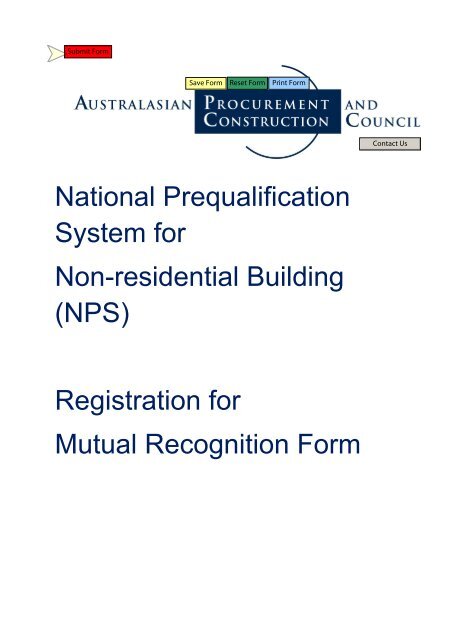
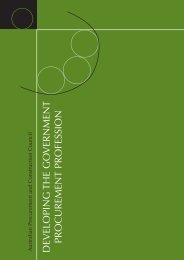
![NATIONAL COST ADJUSTMENT PROVISION EDITION 2 [NCAP2]](https://img.yumpu.com/48266135/1/184x260/national-cost-adjustment-provision-edition-2-ncap2.jpg?quality=85)
